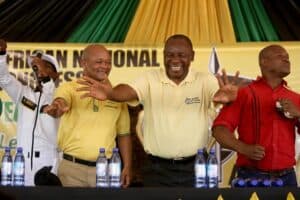A properly managed national dialogue, which could be an inclusive participatory exercise for all groups, would be beneficial.

With so many top leaders and prominent South Africans boycotting the National Dialogue, it risks losing credibility if it continues in its current form, says an expert.
He added that President Cyril Ramaphosa should listen to the dissatisfied leaders and review the process.
Mbeki’s vision: Civil society at the helm
Political economy analyst Daniel Silke said instead of forging ahead, President Cyril Ramaphosa should review or reconstitute it to bring everybody on board.
He said at the core of it all was widespread dissatisfaction with President Cyril Ramaphosa’s leadership – both within and outside of the ANC.
Former president Thabo Mbeki, who first floated the idea of a National Dialogue, indicated during a special congress of the SA Communist Party in December last year that he expected Ramaphosa would merely announce the process, while civil society would occupy the front seat “for the first time”.
Mbeki said the process would be different to the Convention for a Democratic South Africa, which was initiated and dominated by political parties and the elite.
ALSO READ: Mazibuko reaffirms that the National Dialogue will be in the hands of South Africans
Foundations and key players boycott National Dialogue
The multi-stakeholder two-day national convention, which kicked off the National Dialogue, commenced on Friday in Pretoria, despite a stay away by six legacy foundations belonging to prominent anti-apartheid stalwarts, along with the FW de Klerk Foundation.
The foundations, which cited rushing and centralising of the process by Ramaphosa, demanded that it should be led by civil society or citizens themselves.
They were later joined by the Kgalema Motlanthe Foundation, which pulled out but cited that its mandate had nothing to do with pursuing political projects. Motlanthe was quoted by the Sunday Times as saying: “We work in accordance with the deed of trust and the foundation’s work.”
Among other boycotters were the DA and Freedom Front Plus. Non-participation by these parties meant most whites have no voice in a dialogue on their country’s future. Several other parties were not at the event.
ALSO READ: Still no confirmation on cost of controversial National Dialogue
Ramaphosa unshaken by absentees
At the gathering, Ramaphosa seemed unperturbed by the senior leaders’ absence, emphasising the significance of his role in the process, saying he has to be “allowed to be the president”.
This was seen as a broadside against Mbeki, whom some accused of trying to outshine Ramaphosa.
Silke said the credibility of dialogue is bound to be undermined since it was being boycotted by crucial players in the political setup.
“This is a botched attempt at something that could have been beneficial to SA,” Silke said.
ALSO READ: The credibility of the National Dialogue is at stake
Dialogue perceived as ANC-controlled
A properly managed national dialogue, which could be a “listening exercise” for the government and an inclusive participatory exercise for all groups, would be beneficial.
But the process had clearly been seen as an attempt by the ANC to steer the discourse.
Silke added: “What is astonishing is that ANC-linked organisations are increasingly frustrated with the style of leadership of Ramaphosa and the way his ANC is steering South Africa.
“It seems the ANC cannot rely on the veterans any more to provide it with support. It seems it’s a free for all on all sides of the ANC in terms of self-criticism and very publicly so.”
Political analyst Dr George Tsibani backed the view that Mbeki should give Ramaphosa a chance as president to lead the process.
READ NEXT: National Dialogue: Concerns about financial transparency and hotel bookings for delegates






